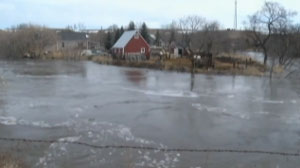 Wild weather caused mayhem across much of the United States this weekend. In the South, there was deadly flash flooding and dangerous winds from Texas to Tennessee. And in the Midwest, there is still no relief from heavy rains and record flooding.
Wild weather caused mayhem across much of the United States this weekend. In the South, there was deadly flash flooding and dangerous winds from Texas to Tennessee. And in the Midwest, there is still no relief from heavy rains and record flooding.
"I thought we was just going to be able to go through it," one motorist said. "But then when we got to here, I started seeing the water get higher and didn't go down."
In just two hours, a half foot of rain caused massive flooding in Houston, with firefighters making 150 rescues during that short time.
And it wasn't just rain causing Houston residents to seek cover. Video footage showed golf ball-sized hail covering cars and floating by in the flood waters.
"All of a sudden hail started pouring down and we started driving real slow," one motorist recalled.
That storm system also worked its way across Tennessee. Some residents chose to evacuate as they saw flood waters rising. Others were forced to leave their homes as authorities patrolled flood-prone areas.
"Our teams are out now assessing roadways, ditches, creek areas and making contact with residents at their homes," one utility worker said.
Meanwhile, flood-weary residents of the Midwest are bracing for more of the same as rivers continue to rise from weeks of heavy rain and melting snow.
"Yeah, it's weird," remarked Midwest resident Natasha Greenlee. "We survived the 2011 flood; it doesn't get to us. But now because it's backed up with the ice here we are stuck."
Forecasters are keeping an eye on the Red River in Fargo, N.D. It's expected to peak soon, which could be as high as 37 or 38 feet. That would be the seventh highest flood on record for the area.
For farmers in the Midwest, the massive amounts of rain and flooding are both a blessing and a curse. It's a welcome change after last years of record drought. But now the water is preventing them from heading out to plant their crops.
Rain across the South is expected to continue, moving eastward to start off the week.

